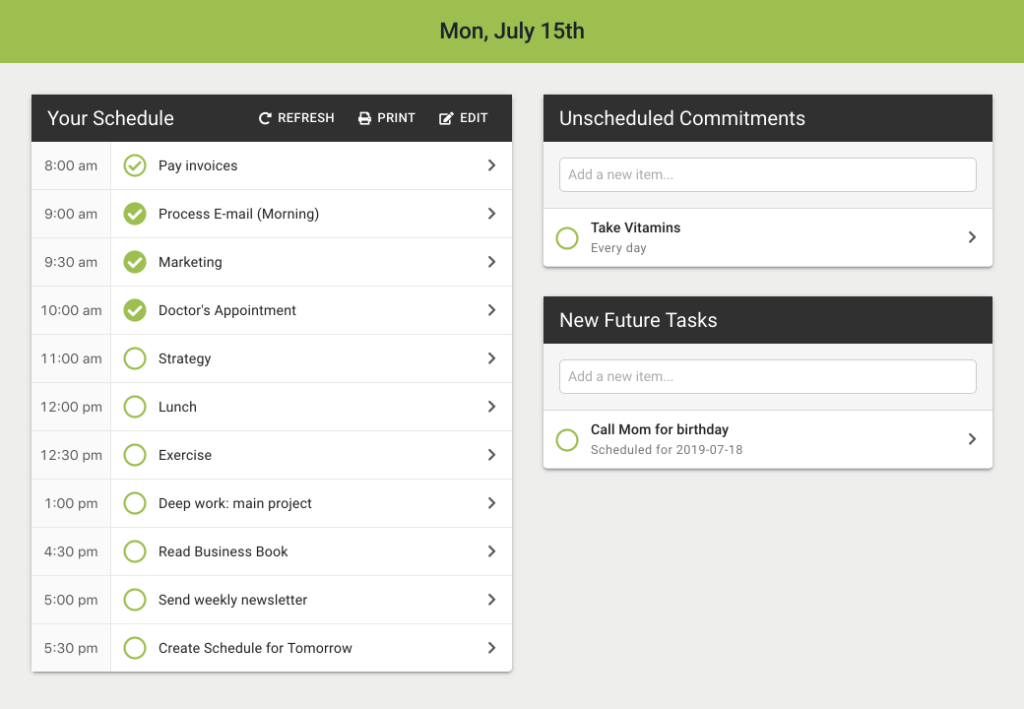Do you do a year-end review where you take a look at what you did the past year and develop plans for the next?
End-of-the-year reviews are wonderful to help you reflect on what you did this year and can be used to inform how you approach next year. But are you using it purely as an analysis and planning exercise? Or are you using your year-end review as an experience in itself?
How we approach reviewing our time directly affects our experience of not only the review process, but how we integrate the learnings that come out of that process. Before diving into the step you may be missing, let’s talk about the different ways we can experience life.
The 3 Ways of Experiencing Life
Everything we do in life can be experienced in three ways:
- Anticipating
Envisioning the future. Anticipation can be enjoyable itself (captured by the German word Vorfreude), but positive anticipation also helps create the motivation to take action. When imagining the future, focus on how you think you will feel rather than what you will see or hear to create the strongest motivation. - Doing
Being in the present. Practices which build mindfulness help expand the experience of time, giving an increased richness and texture to the things we do, and allowing us to deliberately shape our experience. - Remembering
Reliving the past. Remembrance can be analytical, where we dissect what we did to improve our actions in the future, or emotional, where we re-experience the emotions of the past. Reliving the past can help us integrate our experiences in a way that merely reviewing them does not, so focus not only on what you did, but how you felt—and how you feel now that you have some distance.
Each aspect has its place in our experience of life, but the one that is often forgotten is remembering.
When we exert effort, we often quickly forget what we did. We lose sight of our own accomplishments and feel like life is moving too fast.
Taking time to remember what we did—to acknowledge our effort—expands our experience of time, making time feel slower and richer.
Reflection Shifts Your Mindset
Acknowledging our effort can also improve our productivity by building:
- Confidence
Knowing what we have accomplished in the past, even when there were obstacles, can give us confidence we can do the same and more for the future. - Motivation
Seeing what we have accomplished through our efforts helps us set our sights higher and enables us to push through dips. - Momentum
Recognizing effort exerted shows how we are already moving forward, shifting our mindset from starting to maintaining and accelerating that momentum.
While acknowledging effort on a daily basis can help our short-term mindset, it is even more powerful for longer timeframes.
As many people have said in different ways:
We overestimate what we can do in a day and underestimate what we can do in a year.
Doing a monthly, annual or even decennial reflection can help us emotionally tie how our daily work can produce our longer-term visions.
The 3 Aspects of Year-End Reviews
Taking all of this into account, use your year-end reviews for thee purposes:
- Reliving
Mentally relive your key moments, to drive deeper changes to your mindset and bring that feeling into the rest of your planning process. Do this first, so you’ve already shifted your mindset before doing your analysis and planning. - Analysis
See what worked and what didn’t, so you understand better how to make changes. Use this step to learn what a good pace of work for you is, which systems worked for you last year & which didn’t, and what type of things boosted vs derailed you. - Planning
Use the final step to inform your plans for next year. What systems will you adopt to have a better year next year? How can you set achievable, relevant goals? Which habits do you want to let go of and which do you want to adopt?
The step most people miss is, of course, the Reliving step. The intellectual exercise of reviewing your year often feels easier and takes less time than the emotional exercise. But you’ll get so much more out of it if you take the time to not only intellectually connect to your year, but emotionally as well.
Key Takeaway
Remembering (and reliving) is a key part of life that ambitious people often forget to do. Not only does reliving help you in the moment, it solidifies changes to your mindset that can help you moving forward. Use reliving as the key emotional step in your reflection process, separate from the intellectual steps of analysis and planning.








